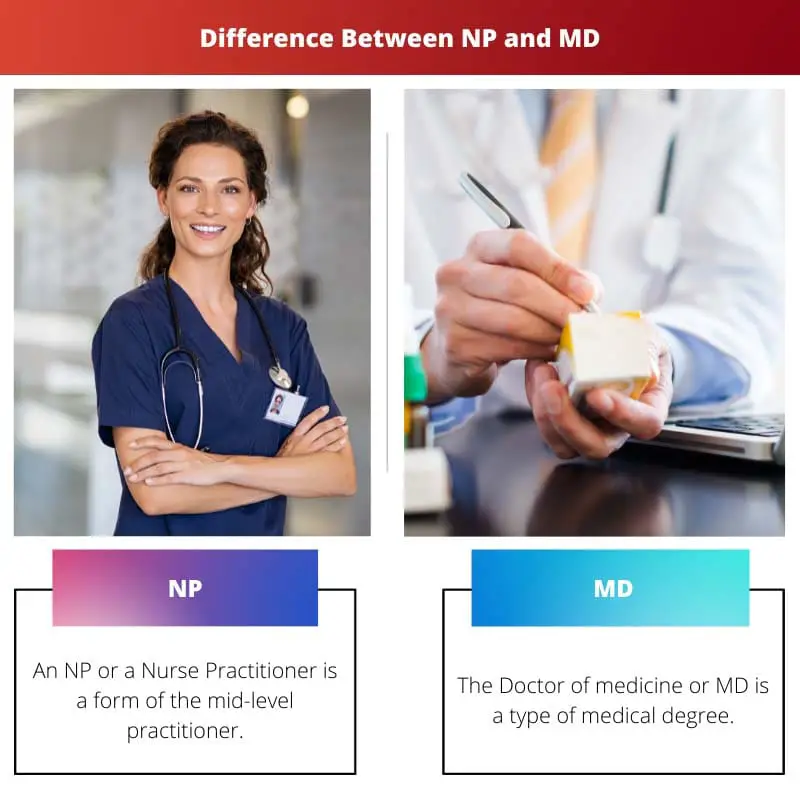In the world of medicine, there exist several posts and designations on which people work. Some are the experts. On the other hand, some are beginners.
Whatsoever the post might be, the primary motto of those working in the medical field is to diagnose, prevent and heal a patient suffering through a particular disorder or disease.
Two of those posts or designations or degrees of work are 1. MD (doctor of medicine) 2. NP (nurse practitioner).
Key Takeaways
- NP stands for Nurse Practitioner and is a registered nurse with advanced training and education, while MD stands for Medical Doctor and is a licensed physician.
- Nurse Practitioners are authorized to diagnose and treat certain medical conditions. They can prescribe medication, while Medical Doctors have a broader scope of practice and can treat a wider range of medical conditions.
- Nurse Practitioners work as primary care providers and may collaborate with Medical Doctors in a team-based approach to patient care.
NP vs MD
An MD (doctor of medicine) gets their license from the Medical Doctor Board. On the contrary, an NP (nurse practitioner) gets support from the Nursing Board.

An NP or a Nurse Practitioner is a form a mid-level practitioner. Nurse practitioners are given training on subjects like examination of the needs of the patients, running analytical tests, prescribing a treatment plan etc.
Their training also encompasses essential prevention of disease and health care promotion of health but does not indulge in the expertise of deeper complexities of a particular condition.
A nurse practitioner can either work independently or under a physician‘s supervision. It was conceptualized in the mid-1960s due to the shortage of physicians back then.
The Doctor of medicine or MD is a type of medical degree. Various countries insinuate different interpretations regarding this degree. For instance, this degree indicates a professional graduate degree in the USA.
On the other hand, in the United Kindom, this degree is a research doctorate or applied clinical degree. It is known that the first degree in the medical field was awarded around the year 1000 by Schola Medica Salernitana.
However, this degree was legally sanctioned in the year 1173 by Roger II of Sicily. It indicated that only those physicians who bore a degree were allowed to perform the activities of a physician.
Comparison Table
| Parameters of Comparison | NP | MD |
|---|---|---|
| Full-form | Nurse Practitioner | Doctor of Medicine |
| Licensed By | The Nursing Board | The Medical Doctor’s Board |
| Education Required | Master Of Science in Nursing | M.B.B.S Degree |
| First founded/awarded in | 1965 | 1000 |
| Initiated by | Loretta Ford and Dr Henry Silver | Schola Medica Salernitana |
| Subtypes | Family Nurse Practitioner, Adult-Gerontology Acute Care Nurse Practitioner, Adult-Gerontology Primary Care Nurse Practitioner, Neonatal Nurse Practitioner, Pediatric Nurse Practitioner (primary or acute care), Psychiatric Mental Health Nurse Practitioner, Women’s Health Nurse Practitioner | General Physician, Pediatrician, General Surgeon, Cardiologist, Dentist, Dermatologist, Gynecologist, ENT Specialist, Allergist/Immunologist, Anesthesiologist, Colon or Rectal Surgeon, Critical Care Medicine Specialist, Endocrinologist, Emergency Medical Specialist, Family Physician, Gastroenterologist, Geriatric Medicine Specialist, Hematologist, Hospice and Palliative Medicine Specialist, Infectious Disease Specialist, Internists, Medical Geneticist, Neurologist, Nephrologist, Obstetrician, Oncologist, Ophthalmologist, Pathologist, Osteopath, Podiatrist, Psychiatrist, Preventive Medicine Specialist, Pulmonologist, Radiologist, Rheumatologist, General Surgeon, Urologist, Sports Medicine Specialist, Sleep Medicine Specialist |
What is NP?
An NP or a Nurse Practitioner is a form mid-level practitioner. Loretta Ford and Dr Henry Silver launched the first program regarding this degree in 1965.
One must have a Master of Science in Nursing degree to pursue this profession. Examination of the needs of the patients, running analytical tests, prescribing a treatment plan etc., are the topics on which training is given to nursing practitioners.
Apart from that, they are given training on topics such as primary prevention of disease and health care promotion of health but do not indulge in the expertise of deeper complexities of a particular condition.
The scope of practice in this field differs from state to state and country to country. In some forms of the USA, nurse practitioners can work independently. On the other hand, in some places, they have to work under the supervision of a physician.
The national shortage of physicians in the mid-1960s led to the concept of advanced nurse practice.
After Dr Henry Silver and Loretta Ford created the first formal graduate certificate program for nurse practitioners in 1965, the US Secretary of Health, Education and Welfare, Elliot Richardson, recommended developing nursing practice.
The nursing program was initiated at different times in different countries. In Canada, the nursing program was created in the 1990s in Ontario.
The nurses collaborated with Physicians and Pediatricians and practised in the neonatal intensive care unit. The program’s licensing and board certification system varies from country to country.
Likewise, the criteria for opting for a job in this field differ in different countries.

What is MD?
The Doctor of medicine or MD is a type of medical degree. Different countries have conceptualized different interpretations of this degree. The first degree in this category was awarded in the year 1000 by Schola Medica Salernitana.
It was first sanctioned in 1173 by Roger II of Sicily and then by Emperor Federico II in 1231. The initial sanctioning and awarding were done in the Constitution of Melfi.
After that, the physicians who were the awardees of this degree were only allowed to practice the activities of a physician.
In 1703, the University of Glasgow awarded this degree to their first recipient Samuel Benion. Columbia, Penn, Harvard, Maryland and McGill were some early North American schools that granted the doctor of medicine degree.
Surgeons and Physicians who studied in England and Scotland founded these schools. The foundations of these schools are responsible for the exceptional evolution that escalated in the medical field.
As mentioned earlier, different countries interpret the degree of MD differently. In Argentina, the First degree of Physician Diplomate is equivalent to the MD degree in North America.
In Afghanistan, no prior degree in medicine is required, and students can pursue a medical degree directly after high school. Australian medical schools show traces of British tradition in the medical field.
The students are free to do higher research after their MD degree. In Canada, students must give an entrance exam after their bachelor‘s degree to pursue an MD degree. These different systems in different countries help to construct a solid medical background of a particular country.

Main Differences Between NP and MD
- An MD gets his/her license from the Medical Doctor Board. On the contrary, an NP receives their license from the Nursing Board.
- The educational qualifications required to become an MD is that a candidate must pursue an MBBS Degree. On the other hand, the academic qualifications required to become an NP is that a candidate must pursue a Master Of Science in Nursing degree.
- The initiation of an MD degree took place in the year 1000. On the other hand, the initiation of an NP degree took place in the year 1965.
- An MD must do work that includes complex cases and challenging areas. On the other hand, a nurse practitioner’s job includes a patient’s health care, running analytical tests, and assessing the patient’s needs.
- Schola Medica Salernitana awarded the first MD degree. On the other hand, the first NP degree was awarded by Loretta Ford and Dr Henry Silver.






